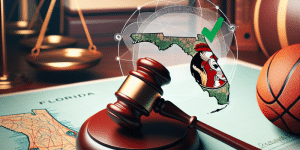The Tucson Sugar Skulls, an Indoor Football League team, have initiated a lawsuit accusing two prominent law firms of legal malpractice and breach of fiduciary duty. This legal action follows the team’s unsuccessful attempt to secure a sports betting license in Arizona, a move they argue was mishandled by their legal representatives.
On October 30, the Sugar Skulls filed the lawsuit in Pima County Superior Court. The defendants named in the case include Heidi Staudenmaier and Snell & Wilmer LLP, along with Adam Berger and Duane Morris LLP. The Sugar Skulls allege these attorneys prioritized their relationships with high-profile companies in the sports betting industry, such as Fanatics Betting and Gaming, over their obligations to the team. This alleged conflict of interest, the team argues, directly led to their failed license bid.
In 2023, the Sugar Skulls entered into a strategic partnership with Fanatics, aiming to secure one of the limited event wagering operator licenses under Arizona’s Event Wagering Act. The partnership promised significant financial benefits, including a guaranteed payment of $5 million upon license approval and a share of annual profits and marketing revenues from Fanatics.
However, the Arizona Department of Gaming (ADOG) rejected the joint application in August 2023. The reason cited was the team’s home venue not meeting the required 10,000-seat minimum for eligibility. This denial led to a fallout with Fanatics and subsequent allegations from the Sugar Skulls that their lawyers mishandled the appeal process and failed to disclose critical conflicts of interest.
The central issue in the ongoing dispute is the structure of Fanatics’ application. According to the Sugar Skulls, they intended to focus on an online wagering license rather than a retail betting license linked to a physical sportsbook. They claim their lawyers allowed Fanatics to pursue a broader retail and online application without their consent, a decision that ultimately doomed their bid.
The Sugar Skulls point out that the ADOG had informally suggested a new online-only proposal might succeed in the next licensing window. However, Fanatics withdrew from the partnership before this opportunity arose, opting instead to partner with a tribal gaming entity and later securing a state license by March 2024.
Previously, the Sugar Skulls tried to prevent Fanatics from reapplying, but their court effort was unsuccessful. The judge ruled that Fanatics’ independent application did not pose a direct threat to the Sugar Skulls’ business interests. The team now estimates this lost opportunity cost them potential profits of $15 million over five years and up to $50 million over a decade, while Fanatics remained unaffected.
In the broader context, this case highlights the competitive and often contentious nature of the sports betting industry, especially in a market like Arizona, which has strict regulations and limited licenses. The Sugar Skulls’ lawsuit underscores the high stakes involved in securing these licenses and the significant financial implications of legal and strategic missteps.
An alternative perspective in this scenario considers the complex regulatory environment in Arizona. While the Sugar Skulls hold their attorneys accountable, it’s also plausible that the stringent state requirements and the competitive nature of licensing played a significant role in the outcome. The team’s oversight or misunderstanding of these regulations could have contributed to the unsuccessful application.
From the viewpoint of those familiar with the intricacies of the legal field, the Sugar Skulls’ allegations raise questions about the responsibilities of legal counsel in managing conflicts of interest and the extent to which they should prioritize client interests over other industry relationships. As one might argue, the attorneys’ failure to adequately manage these aspects has led to the Sugar Skulls’ current predicament.
In conclusion, the Tucson Sugar Skulls’ lawsuit serves as a cautionary tale for sports teams and businesses entering the burgeoning sports betting market. It emphasizes the need for clear legal guidance and strategic alignment with market realities to ensure successful ventures amid stringent regulatory environments. As the case proceeds, it will likely provide further insights into the legal responsibilities of counsel in high-stakes industry negotiations and the complexities of navigating the regulatory landscapes in emerging markets like sports betting.

David Harrison stands tall in gambling journalism, marrying his firsthand casino experiences with a deep understanding of betting psychology. His articles transform complex gambling jargon into engaging tales of strategy and chance, making the world of betting accessible and enjoyable. David’s knack for narrative extends beyond print, making him a sought-after speaker on gambling trends and future bets. In the realm of gambling, David is both a scholar and a storyteller, captivating readers and listeners alike.
















